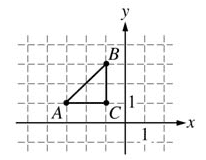The Praxis Core Series consists of three exams: Core Math, Core Reading, and Core Writing. In this post, we’ll look at a cross section of these exams, with two typical questions from each exam.
Core Math practice questions
1) If 3(9x-5) = 8(3x)-2, what is the value of x?
Give your answer as a fraction:
( )/( )
2) 
Triangle ABC will be translated 2 units to the left and then 3 units up. What point will correspond with vertex A after these translations?
a. -4, -4
b. 4, -5
c. 4, 4
d. -5, 4
e. -5, -5
Core Reading practice questions
Questions 3 and 4 refer to the following passage:
In the United States, Japan, and a handful of other countries, eggs are washed and sanitized before they are shipped to supermarkets, and are kept refrigerated until they are prepared and eaten. In nations that practice egg washing and egg refrigeration, conventional wisdom states that this is the only way to keep eggs free of contaminants and safe to eat.
However, there is another effective approach to keeping eggs safe for consumption. In many European and Asian countries, the chickens that lay eggs receive vaccinations for salmonella and other diseases. When this preventative measure is taken, freshly laid eggs are contamination-free and do not need to be washed. Furthermore, if eggs are not washed, they retain the protective outer covering on their shells, which keeps bad bacteria out. With this protection in place, eggs can be stored at room temperature for days.
3) The author most likely mentions “conventional wisdom” in the first paragraph in order to
a. strengthen the assertion that eggs are washed and refrigerated only in the U.S. and Japan.
b. suggest that there may be other ways to keep eggs safe and unspoiled
c. change the topic from egg production to cultural preferences regarding food safety
d. provide a summary of the reasons that the U.S. and Japan wash and refrigerate eggs
e. weaken the argument that eggs are refrigerated throughout their distribution cycle
4) The passage indicates which of the following about food safety practices regarding eggs?
a. It is sufficient to wash eggs but not actually refrigerate them.
b. Although some countries used to leave eggs unrefrigerated, this is no longer a common global practice.
c. If eggs are washed, it is necessary to also refrigerate them.
d. Vaccinating chickens is more effective than washing eggs.
e. Eggs cannot be kept fresh if their protective outer layer is washed away.
Core Writing practice questions
5) Look at the underlined portions of the sentence and identify the error.
The poinsettia plant does not have large red blossoms, although many people see the red leaves surrounding the poinsettia’s small yellow flowers and mistakenly believe the colorful leaves were flower petals. No error.
6) Choose the correct version of the underlined portion of the sentence.
Alice in Wonderland’s seemingly nonsensical passages contain many hidden references to mathematics, perhaps inspired by author Lewis Carrol’s own work as a mathematician.
a. perhaps inspired by author Lewis Carrol’s own work as a mathematician
b. perhaps inspired by author Lewis Carrol’s being a mathematician at the time he wrote it
c. perhaps inspired with author Lewis Carrol’s own work as a mathematician
d. perhaps inspired and by author Lewis Carrol’s own work as a mathematician
e. perhaps inspired by author Lewis Carrol’s mathematics workings
ANSWER KEY
Math questions:
1) 13/3
2) d
Reading questions:
3) b
4) c
Writing questions:
5) fourth choice
6) first choice
So how’d you do? Full explanations of the answers will be given in Part 2 of this post, coming soon.





Leave a Reply